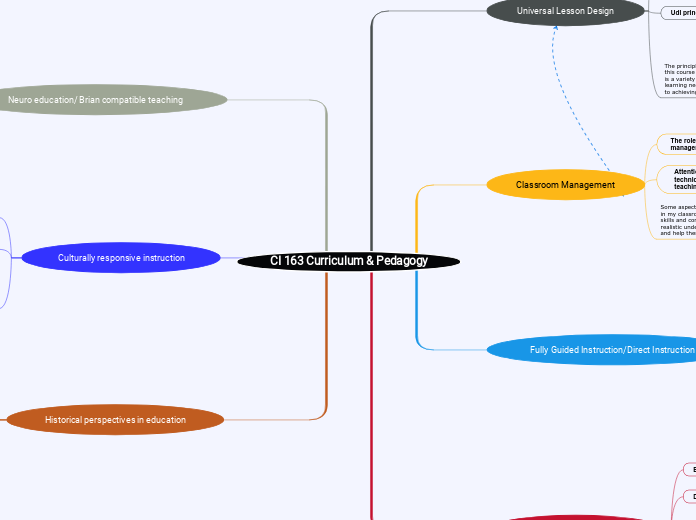CI 163 Curriculum & Pedagogy
Universal Lesson Design
Barriers of traditional education
Poverty
Conflict, insecurity and instability
Lack of resources
Climate change
Food insecurity
Udl principles
Representation
Refers to the way content is presented to students
Engagement
Refers to the flexibility inthe ways information is presented to students
Action expression
Refers to the principle in providing students with a diverse way of expressing their understanding and skill development
The principles of udl relate to each other and other aspects of this course as it provides us a better understanding that there is a variety of strategies and resources to help meet the learning needs in students and improve students accessibility to achieving academic success.
Classroom Management
The role of socio emotional learning on classroom management
Is helpful to both students and teachers as it increases self awareness, academic achievement and positive behavior in the classroom
Attention continuum and surface management techniques: Frameworks for maintaining the flow of teaching
Helps teachers address disruptive behaviors without interrupting the classroom instruction
Some aspects of socioemotional learning that I will incorporate in my classroom is teaching students the social emotional skills and competencies. I will make sure students gain a realistic understanding of his/ her strengths and limitations and help them attain a consistent desire for self improvement.
Fully Guided Instruction/Direct Instruction
Writing behavior objectives
Is a learning outcome that gives direction to the learners experience and becomes the basis for student evaluation
Lesson development
Helps establish learning opportunities for students to achieve their learning objectives
Designing UDL lesson goals with flexible means
Allows students to understand how difftools and resources support them in helping them obtain their lesson goals
The benefits of lesson design using a fully Guided approach is a very effective to use in the classroom as it allows teachers to develop behavior objectives model student behavior, help students practice their everyday expectations and help teachers develop exit tickets to check for students understanding of the curriculum. Using this approach is to help us teachersvto identify students learning barriers in the classroom
Critical/Higher level thinking
Blooms taxonomy
Is a hierarchical model to classify educational learning objectives
Depth of knowledge (DOK)
Helps categorize task to the complexity of thinking required to successfully complete them.
Z chart for writing objectives
A graphic organizer that helps students summarize information using linguistics and non linguistic representation
The roles of blooms taxonomy and dok play in teaching is that both Frameworks are used to enhance the quality of student thinking by infusing higher level objectives in the teachings. The way I can apply blooms taxonomy is to help measure students instruction of materials, class objectives and applying cognitive rigor in the classroom. As for dok it helps me analyze the specifics in Frameworks of assignments.
Neuro education/ Brian compatible teaching
Mnemonic strategies
A mnemonic is an instructional strategy designed to help improve students memory of information.
Graphic organizers
Is known as a knowledge map or a concept diagram that is used as a pedagogical tool that uses visuals to express knowledge
Brain compatible instructional strategies
Refers to teaching methods, lesson designs and school programs that are based in factors of cognitive development on howstudents learn differently as they grow
Some aspects of brain compatible teaching that I will incorporate into my classroomwill be the use of Menomic strategies to help to help students learning important information. Graphic organizers will be used to help strengthen students understanding of vocabulary and concepts by the use of visual representation.
Culturally responsive instruction
Using storytelling as culturally responsive teaching
Is a great way to connect with classroom content and also connect with students cultural
Using participatory narrative inquiry (PNI) for ethnographic study
Help students discover insights, resolve conflicts and connect with students In a interpersonal level
I will incorporate culturally responsive instruction in my classroom by sharing stories that relate to the content and culture of students as a cultural responsive teaching method and giving students the opportunity of using participatory narrative inquiry for ethnographic studies.
Historical perspectives in education
Sabertooth curriculum
Was based off of the importance of education reform of curriculum in the classroom
Lessons of a century
Help us understand the historical development of lesson design over the years
Developing classroom management using RTI
Brought a great understanding of how to establish great classroom management skills by the use of behavioral intervention strategies
A good teacher in every classroom
Made us understand the importance of the great teacher characteristics a teacher should have and use in a classroom
The historical perspectives in education made us get a broad understanding of the many topics of the importance of education reform, lesson design, classroom management skills and the development of a good teacher in the classroom.
